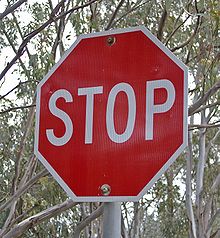
Stop sign – Wikipedia.org
So many of my students, mainly college students, keep reaching for dictionaries. Every time they see a word they don’t understand or get into a situation where they don’t know the perfect word in English like they do in their first language out comes their smartphone for the dictionary or their Casio Ex-Words.
Every language learner needs a good monolingual dictionary. I usually recommend the Longman English Learner’s Dictionary. However, it’s a reference book, not a best friend.
You need to guess words sometimes
If you check the dictionary every time you see a new word you lose the chance to learn how to guess the meaning from context. Checking it in a monolingual dictionary is one thing; bilingual dictionaries are for beginners. They are your last resort.
You are going to cause a communication breakdown
If you are in the middle of a conversation and someone says a word you don’t understand, are you really going to reach for your dictionary? I hope not. You ask questions or ask, “Did you mean ~?” You are a non-native so don’t be afraid of this question because even natives need to ask it sometimes.
You need to be comfortable with being ‘basically right’ rather than ‘exactly right’
If you develop your language by guessing and using your feelings as a guide while you read and listen, you’ll find your vocabulary choices get so much better. Rather than learning a list of words from the dictionary, learning words by context is much more rewarding. You also learn the different ways a word can be used as you develop your language and need to use words in different situations.
If you use a bilingual dictionary you reject other correct meanings
What usually happens when students use bilingual dictionaries is that they learn an English word with only a single word in their first language. However, not all languages translate easily from and from English, especially Japanese. Why not use pictures to learn meaning, or actual sentences? Use Google Images and Pinterest to find and keep pictures or search Twitter for short sentences with new words. You can even do this with word cards.
I hope this helps you get the confidence to put your dictionary away for a day or two. Let me know how you go in the comments.
